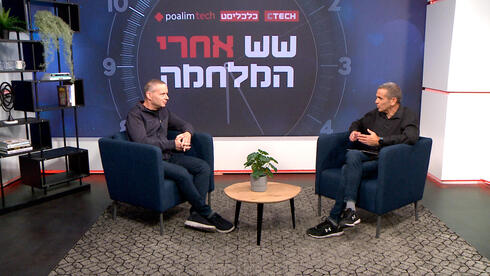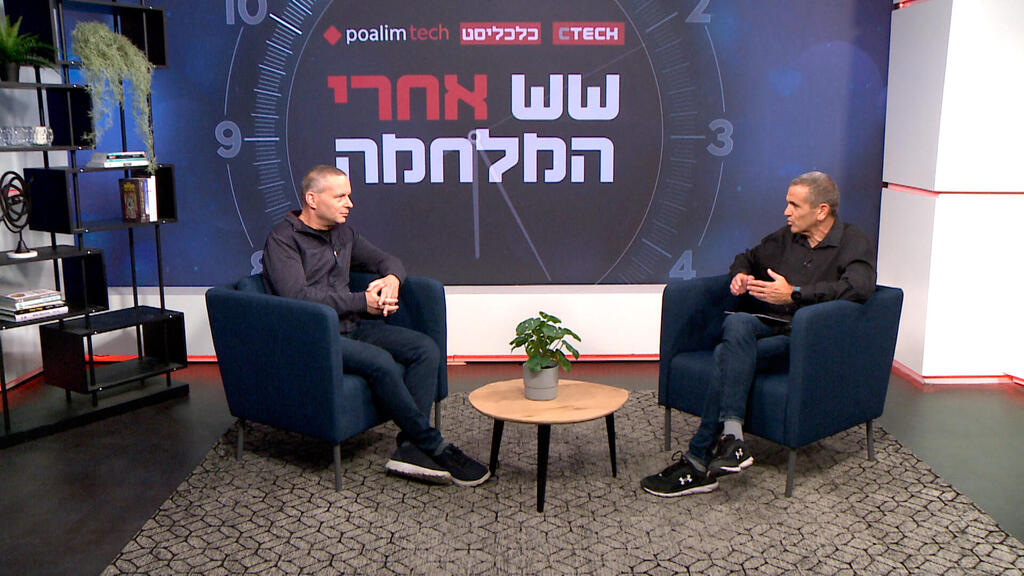
Six After War
"Only high-tech will take the State of Israel out of the place it is in financially"
As part of Calcalist and Poalim Tech's series of online interviews "Six After War", Meir Orbach spoke with the former Minister of Science & Technology and entrepreneur Izhar Shay about the future of the startup nation and his son Yaron, a fighter in the Nahal Brigade who fell defending Kerem Shalom on October 7
"We have sorrow and sadness and a sense of bereavement that will never leave us, but there is also significance to the fall of our son Yaron and his comrades, whose heroism saved civilians and soldiers and in this way protected the State of Israel," entrepreneur and former Minister of Science & Technology Izhar Shay, whose son Yaron, a fighter in the Nahal Brigade, fell defending Kerem Shalom on October 7, said when asked where he and his wife get the strength to get up every day and be vital.
Shay was speaking as part of Calcalist and Poalim Tech's series of online interviews "Six After War".
"Alongside the immense pain and sorrow, we feel a moral obligation to stand up every day anew and honorably represent the values and meaning of the bravery of the warriors and our hero among them. For us, the meaning is to stand up and do things that are also meant to protect the State of Israel and help it, and to continue passing on this legacy of our heroic soldiers, who gave their lives for the homeland."
Similar to the pandemic, the war severely damaged the local economy. How do you see it as someone who was a minister in the previous government?
"I was in the limited cabinet of the Coronavirus pandemic that tried to deal with the economic aspects of the crisis as well. I think that we are now in a similar situation of being in a very severe slowdown, and on the other hand we have existential threats that did not exist during the pandemic. As a country we have proven in the pandemic and in previous crises that we know how to stand up, shake off the dust, and move forward. We are in a position where we understand the situation and we must move forward. I estimate that, as happened in the past, the recovery will come in the coming months and will happen very quickly.
"In the Gulf War, there was an existential fear of millions of people, of missiles with chemical warheads and the country was paralyzed, but very quickly we got out of that into a period of growth and prosperity. I estimate that this time it will be similar both in psychology and in the understanding that we have overcome what is necessary and we are moving forward."
The high-tech industry experienced a severe upheaval even before the war. How do you see the industry moving forward, and should the state do something for the industry?
"We entered the war against the background of an acute global crisis, which the Israeli government has been struggling with and added its own to in the past year, and of course, following the war, there is another slowdown. Hundreds of thousands of high-tech people are being recruited for the war, and high-tech bears the burden of war and volunteerism in a significant way. We have seen that Israeli society is replacing the government in many aspects. So the high-tech ecosystem provides significant support and also pays a price. I see buds of recovery such as people returning and working and hearing about places where reservists work remotely. In addition, investors are banding together and there are even rounds of funding taking place these days. Things are starting to happen and the flow will progress and come, we have no other choice. High-tech is the engine of the economy. If there is anything that will take the State of Israel out of the place it is in financially, it is only high-tech, so there is also a national commitment here. Financing the war costs us about a billion shekels a day."
Tell us about the project "1400 companies" also called "Next October"?
"The meaning of Next October is first of all optimism, we came out of a very bad October and the next one will be better. The goal is to establish about 1,400 companies so that behind every fallen soldier, murdered baby, child, and person who lost their life will stand an innovative and significant Israeli start-up that will bear the name of the fallen, accompany the family and will have an obligation to do everything possible to preserve the memory of the fallen or the murdered. Of course, we will make sure that the project will have good startups that win the trust of the investors in any case. We are in the process of recruiting a mentor to accompany each startup as well as formulating support programs."
Regarding the willingness to invest money these days, Shay says, "I see massive support from the Israeli ecosystem, investors, lawyers, entrepreneurs and international companies. Everyone understands that there is a symbolic and significant interest here. It's not just what is being done for the Israeli economy - 1,400 new jobs that will create new jobs, it is also a message to the world - they came to destroy us, so here is the Israeli answer. Once trees were planted in memory of the fallen, today we are planting innovation!
"We will bring to the world about 1,400 ventures in the fields of agriculture, energy, fintech and everything that Israeli high-tech knows how to produce. Juan Delgado, the incoming CEO of Hamilton Lane, a world leader in investment management for the best institutional investors in the world, visited Israel from Singapore. They are managed in Israel by Limor Beker, and they are doing an exceptional job in bringing many investments to Israel. Delgado wields enormous leverage to bring investments around the world and he came here for two days also to express his sympathy. In our conversation, he told me, ‘Put aside politics and war for a moment, there are excellent reasons to invest in Israeli innovation.' The world understands that the State of Israel is needed to continue producing innovation, innovative technological solutions to problems and challenges as well as global opportunities. He strongly believes in Israel and he and Limor are now working on several deals to bring investments to Israel."
Related articles:
- Rise up nation: Bereaved father calls for 1,400 new startups in memory of Israelis murdered by Hamas
- "For every fallen soldier, for every murdered civilian, let’s put together a new innovative startup," says entrepreneur Izhar Shay, whose son was killed by Hamas
- “Israel must transition from the Startup Nation to the Innovation Nation”
On the seventh of October, all our preconceptions collapsed. Which changed for you? Or was it something that you believed in and realized you need to think about differently?
"We all need to think about how to reform the State of Israel and especially how we run the country. The concept of running a country by generals needs to undergo a complete change. I have a lot of respect for the generals who ran the country in the last decades, but citizens must also be included in this mix. My model for the prime minister of Israel in five years is a woman aged 45-50 who comes from the business world - from high-tech or finance, with experience and after a 20-year career that has proven that she knows how to manage processes and produce good performances. A woman who came to politics out of a sense of mission, not as a profession for life. We as citizens also need to get used to this idea. Every general who leaves the army and wants to become a politician receives 20-30 mandates in the polls, so let's bring in a woman from the business world with abilities and experience and see us citizens give her the 20-30 mandates in the polls and let’s see her running the country. The time has come."














